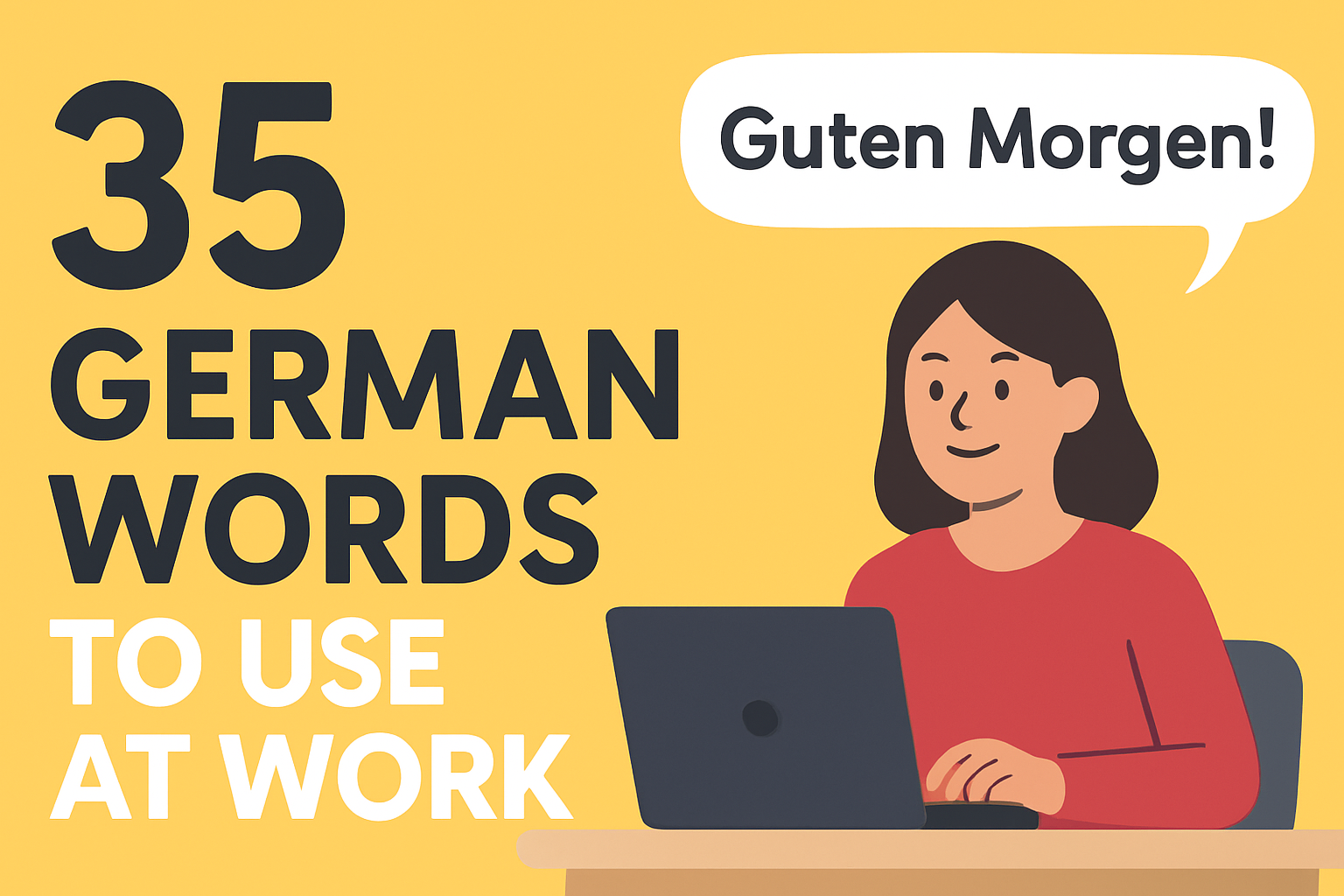🧑💼 Introduction: Speak German Like a Pro at Work
Imagine walking into your German office on the first day — the smell of coffee, the buzz of colleagues chatting, and someone says, “Wie war dein Wochenende?” (“How was your weekend?”).
Wouldn’t it feel amazing to answer back confidently?
This guide covers 35 essential German words and phrases you’ll actually use at work — from meetings and emails to small talk and daily routines. Let’s dive in!
☕ Everyday Office Talk
Let’s start with the words that make up your daily office life.
-
das Büro – office
Ich bin im Büro. → I’m at the office. -
der Kollege / die Kollegin – colleague
Meine Kollegin ist sehr freundlich. → My colleague is very friendly. -
der Chef / die Chefin – boss
Mein Chef ist heute im Meeting. → My boss is in a meeting today. -
die Pause – break
Wir machen um zwölf Uhr Pause. → We take a break at twelve o’clock. -
die Kaffeemaschine – coffee machine
Die Kaffeemaschine funktioniert nicht! → The coffee machine isn’t working!
💡 Tip: Remember Büro sounds like “boo-roh” — it has that smooth “ü” sound, which you can make by saying “ee” while rounding your lips.
💬 Meetings and Communication
Here’s where many learners get nervous — meetings! But don’t worry, once you know a few key words, you’ll feel much more at ease.
-
das Meeting – meeting
Wir haben morgen ein wichtiges Meeting. → We have an important meeting tomorrow. -
die Präsentation – presentation
Meine Präsentation war erfolgreich. → My presentation was successful. -
die Besprechung – discussion
Die Besprechung dauert eine Stunde. → The discussion lasts one hour. -
das Projekt – project
Das Projekt ist fast fertig. → The project is almost finished. -
die Deadline – deadline
Unsere Deadline ist nächste Woche. → Our deadline is next week. -
der Bericht – report
Ich schreibe den Bericht bis Freitag. → I’ll write the report by Friday. -
die E-Mail – email
Ich bekomme viele E-Mails jeden Tag. → I get many emails every day. -
die Aufgabe – task / assignment
Ich habe viele Aufgaben heute. → I have many tasks today.
🖥️ Work Actions and Verbs
Now, let’s look at the verbs — the doing words you’ll use all the time.
-
arbeiten – to work
Ich arbeite in einer Firma. → I work in a company. -
besprechen – to discuss
Wir besprechen das später. → We’ll discuss that later. -
schreiben – to write
Ich schreibe eine E-Mail. → I’m writing an email. -
anrufen – to call (someone)
Ich rufe den Kunden an. → I’m calling the client. -
organisieren – to organize
Sie organisiert die Veranstaltung. → She organizes the event. -
planen – to plan
Wir planen ein neues Projekt. → We’re planning a new project. -
senden – to send
Ich sende dir die Datei. → I’ll send you the file. -
überprüfen – to check / review
Bitte überprüfe die Zahlen. → Please check the numbers.
👥 People and Roles at Work
These are the people you’ll meet (and maybe email daily).
-
der Kunde / die Kundin – client / customer
Der Kunde wartet auf eine Antwort. → The client is waiting for a reply. -
das Team – team
Unser Team arbeitet gut zusammen. → Our team works well together. -
der Praktikant / die Praktikantin – intern
Der Praktikant hilft im Büro. → The intern helps in the office. -
der Manager / die Managerin – manager
Mein Manager ist sehr erfahren. → My manager is very experienced. -
der Mitarbeiter / die Mitarbeiterin – employee
Die Mitarbeiter sind motiviert. → The employees are motivated.
⏰ Time and Work Schedule
A few time-related words to help you manage your workday like a pro.
-
der Arbeitstag – workday
Mein Arbeitstag beginnt um acht Uhr. → My workday starts at eight o’clock. -
das Wochenende – weekend
Ich freue mich auf das Wochenende. → I’m looking forward to the weekend. -
die Arbeitszeit – working hours
Meine Arbeitszeit ist flexibel. → My working hours are flexible. -
die Mittagspause – lunch break
Ich gehe in der Mittagspause spazieren. → I take a walk during lunch break.
💡 Useful Office Expressions
Now for some real-life phrases you can use immediately.
-
Kein Problem! – No problem!
Kannst du das übernehmen? – Kein Problem! → Can you take care of that? – No problem! -
Gute Arbeit! – Good job!
Das hast du super gemacht – gute Arbeit! → You did great – good job! -
Ich bin beschäftigt. – I’m busy.
Kannst du kurz sprechen? – Ich bin beschäftigt. → Can you talk for a moment? – I’m busy. -
Ich stimme zu. – I agree.
Ich stimme deiner Meinung zu. → I agree with your opinion. -
Ich brauche Hilfe. – I need help.
Ich brauche Hilfe bei diesem Bericht. → I need help with this report.
🧠 Mini Exercise: Can You Match Them?
Try this quick challenge:
Which German word fits these English meanings?
-
To send → _______
-
Lunch break → _______
-
Employee → _______
-
To plan → _______
-
Meeting → _______
(Answers: senden, Mittagspause, Mitarbeiter, planen, Meeting)
🌟 Memory Tip
Here’s the trick:
Group vocabulary by theme and visualize your day.
Imagine walking into the office and naming everything in German — das Büro, der Chef, die Kaffeemaschine.
Context makes words stick faster than rote memorization.
🏁 Conclusion: Practice Makes Perfect!
Now that you know 35 useful German words for work, try using them in your daily routine. Label things at your desk, speak short phrases to yourself, or even write a pretend email in German.
When you connect the words to real-life moments, learning German becomes natural — and fun.

